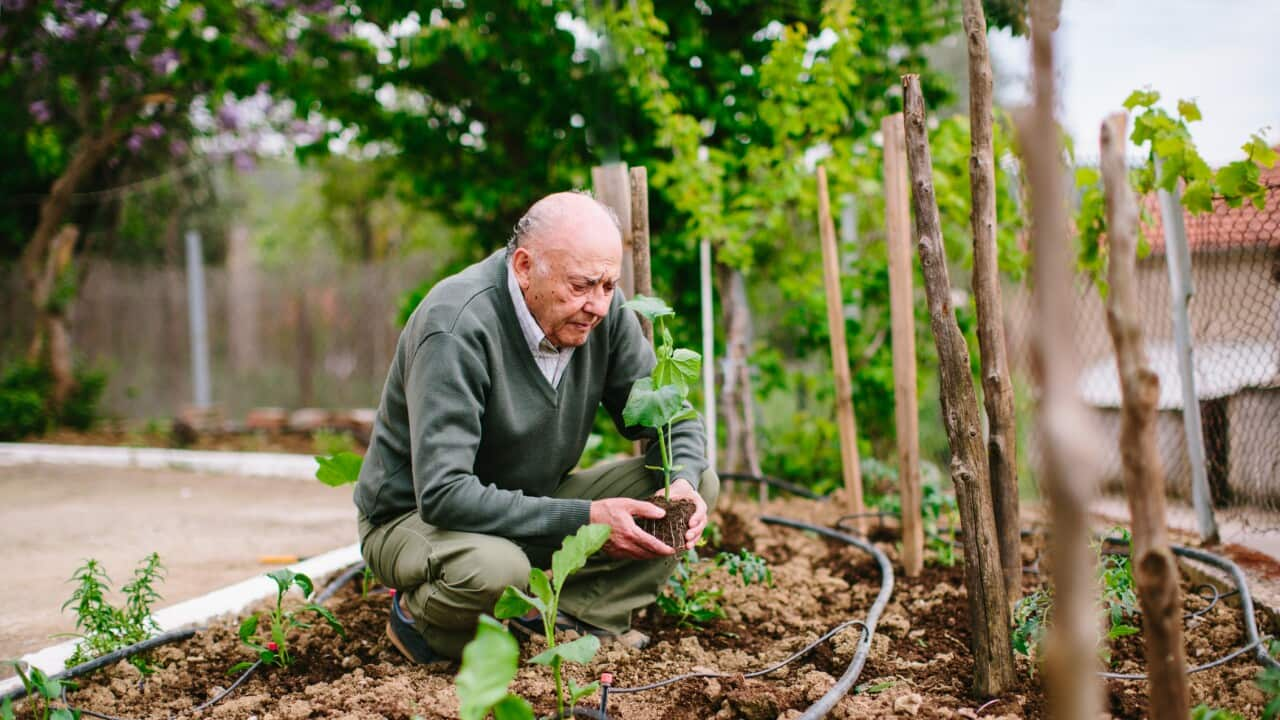Highlights:
- Gardening has long been proven to have health and wellbeing benefits, and has been incorporated in clinical-backed therapeutic programs.
- It can also take on extra significance for migrant communities, for whom tending to the garden is closely aligned with cultural traditions.
- Refugees from Afghanistan benefit from growing crops as a therapy to deal with the trauma of war.
This story is part of the SBS health and wellbeing initiative Mind Your Health. Click to visit the portal, featuring digital stories, podcasts and videos in English and multiple languages.
The garden is regarded by many as a space that , which has given rise to clinical-backed therapeutic programs in a number of settings, including aged care and disability services.
Professor of Physical Activity and Health, Anne Tiedemann, says there’s an abundance of evidence linking gardening and being outdoors to mental health benefits.
“Gardening is fantastic and certainly can bring lots of benefits. We know that having a routine is really important for people's well-being,” she says.
It can also take on extra significance for migrant communities in Australia, for whom tending to the garden is closely aligned with cultural traditions passed down through generations; feelings of identity and togetherness, and as a form of therapy for newly arrived refugees.
“People coming together from the same cultural background... can feel comfortable with each other's company [while gardening],” Prof Tiedemann explains.
“They can have that combined sense of purpose of growing food, for example, and caring for something.”
Tradition, passata day and garden pride
It’s common for Italian-Australian families to associate gardening with seasonal events marked across the generations in the home country, SBS journalist Andrea Pagani explains.
One such event is the 'passata day', where families gather to collect, cook and bottle ripe tomatoes.

Passata is a tomato puree that has been strained from seeds and skins. Credit: Submitted by Dmitri Levin
Such events feature a “hierarchy of roles and tasks” among family members.
“The older men look after the fire and the big barrel where they cook all of the tomatoes,” Mr Pagani says.
He says women are traditionally in charge of the sterilisation of the bottles and even children are given jobs such as placing fresh basil leaves in the containers before sealing.
Such traditions found their way to Australia through waves of migration and have contributed to “maintaining identity” among Italian-Australians over the decades, even seen through second and third generations.
“Italians born in Australia, who are basically fully Australian ... still go to the nonna's house and make the tomato on passata day so that's still a strong happening, a strong family event," Mr Pagani says.
“It's a sort of ‘secular Christmas’ and it's an opportunity for the family to get together and catch up.”
Similarly, Afghans who have settled in Australia grow seasonal flowers and vegetables, a practice that is tied to intra-family relationships, says SBS Pashto Executive Producer Abdullah Alikhil.
“A lot of families exchange those kinds of plants with each other, it’s something that is very engaging, starts conversations, and brings the community together," he says.
“We do have families who grow a lot of vegetables in their backyards and that's something they enjoy a lot. You often visit a house and see cucumbers that will be freshly cut and presented on the table and that's something that they really feel proud of and they say ‘this is from my garden, try it’.”

A tropical vegetable, cucumbers thrive when the weather is hot and water is plentiful. Credit: Westend61/Getty Images/Westend61
Gardening as a settlement aid for refugees
Afghanistan is a landlocked country and farming is seen as an exercise for a people in “love with nature”, and a pastime continued by community members who arrive in Australia as refugees, Mr Alikhil says.
Gardening has been proven to act as a form of therapy for refugees, who face complex challenges when they arrive in a new country, and various programs including the have been established as a result.
For Afghan refugees in the community, growing fruits, vegetables and flowers, not only assists with settlement in Australia but also provides a calming influence to deal with the trauma endured as a result of the war in their country, Mr Alikhil explains.
“Settlement is a process where they get to know the new country, the culture and also the language. The only thing that doesn’t require any cultural or linguistic skills is the land, that is what they have, and they own it.
“It makes them calm and close to nature, it is an opportunity for them to switch off whatever trauma they might be experiencing from the ongoing situation in Afghanistan and also their settlement here.”
Familiarity and growing what’s not readily available in Australia
The types of vegetables and plants grown in the gardens of Greek Australians are often those cultivated in the homeland, are grown according to the seasons and are often used in cooking, says SBS Greek journalist Dina Gerolymou.
“Greeks in Australia love gardening and they love to grow their own fruit and vegetables; they take a lot of pride in using their own produce in the kitchen to cook their favourite dishes and feed their children and grandchildren," she says.
“There’s a source of accomplishment and pride in having a productive garden, it gives them a sense of achievement.”
Although many vegetables are available all year round, Ms Gerolymou explains that it’s uncommon for members of the Greek community to cook a summer dish in winter.
“In winter, you have wild greens, endive, chicory, lettuce, beetroot, potatoes, and in summer, you have tomatoes, cucumber, capsicums, beans and amaranth for example.
“Greeks [in Australia] have been cultivating amaranth for a very long time. Why? Because they couldn’t find it in the shops in Australia. But also, because they’re used to having these kinds of vegetables in the garden.
“It's recreating what they had in their homeland. Growing the fruit, veggies and herbs they are familiar with helps them to maintain a connection with their birthplace.”
Gardening fosters a sense of community
Mr Pagani says gardening and growing vegetables has been an important mechanism for establishing communities in Australia, as seen historically among Italian migrants who farmed tobacco in Victoria’s northeast during the 1920s.
“It's very important for the establishment of communities, having something to share that went beyond the job and the work because remember, the farmers working in the King Valley, or the Alpine Valley were big Italian communities working hugely on tobacco.
“Farming and gardening was something that they could share beyond work so (it helped to create) social relationships."
This ability to create social networks was crucial in the past when there was no internet and receiving a letter from family could take up to four months.
Farming and gardening helped workers create a new 'family' with each other, he says.





